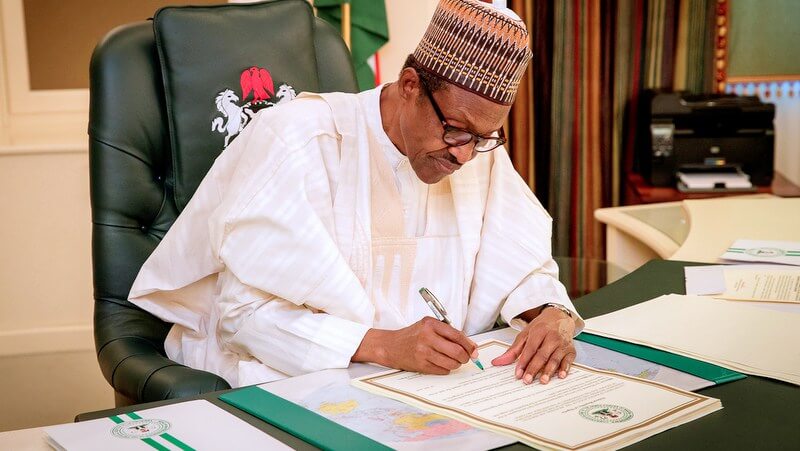There are indications that President Muhammadu Buhari may yet again withhold assent to the controversial Electoral Act (amendment) Bill which was transmitted to him on Wednesday, THE WHISTLER has learnt.
If the president withholds his assent, it will be the fourth time he will be doing so, having previously rejected the bill on three other occasions.
Advertisement
Some parties, especially the newly registered ones, told this newspaper that there are plans afoot to challenge the bill over the limited timeframe for the implementation of the Act if passed into law.
“Election is barely three months away, so even if the bill is passed into law, when do you expect the implementing commission, INEC and political parties, to become conversant with its provisions?” A source told our correspondent.
“Do you know the implications of allowing the card reader as the sole means of accreditation of voters in the country? How are we sure that the process will not be hijacked electronically?” Another source said.
Owing to fears about its implementation, plans have been concluded by some of the parties to seek legal redress.
Advertisement
The new bill it is expected will improve the country’s electoral process ahead of the 2019 general elections, including the use of the card reader as the sole means of accreditation of voters.
When the president declined assent, the Senior Special Assistant to the President on National Assembly Matters (Senate), Sen. Ita Enang, explained that one of the concerns of the President was the period fixed for primaries.
He said the schedule for primaries provided that it should not be earlier than 120 days and not later than 90 days to elections.
He further said the schedule would allow Independent National Electoral Commission (INEC) only 9 days to collate list of candidates among others.
“His Excellency, President Muhammadu Buhari, has by communication dated Aug. 30, 2018, to the Senate and the House of Representatives declined assent to the Electoral (Amendment) Bill, 2018.
Advertisement
“I pray for leave, that in view of public interest, the fact of the National Assembly vacation, the imperative to avoid speculation and misinformation, that I give just a few of the rationale by Mr. President.
‘’Mr. President is declining assent to the Electoral Amendment Bill due to some drafting issues that remain unaddressed following the prior revisions to the Bill.
“Mr. President invites the Senate and House of Representatives to address these issues as quickly as possible so that he may grant Assent to the Electoral Amendment Bill.”
Enang added that Section 87(14) of the bill among other sections, needed to be reviewed by the national assembly.
He said, “the proposed amendment to include a new Section 87 (14) which stipulates a specific period within which political party primaries are required to be held has the unintended consequence.
“It leaves INEC with only nine days to collate and compile lists of candidates and political parties as well manage the primaries of 91 political parties for the various elections.
Advertisement
“This is because the Electoral Amendment Bill does not amend sections 31, 34 and 85 which stipulates times for the submission of lists of candidates, publication of lists of candidates and notice of convention, congresses for nominating candidates for elections.”
He further said, “for clarity, may I provide some details of the provisions referenced.
“Clause 87 (14) states that, ‘the dates for the primaries shall not be earlier than 120 days and not later than 90 days before the date of elections to the offices.
“The Electoral Act 2010 referred to herein states in Section 31, ‘’that every political party shall, not later than 60 days before the date appointed for a general elections, submit to the Commission the list of candidates the party proposes to sponsor at the elections.
“Section 34 stipulates that ‘the Commission shall at least 30 days before the day of the election publish a statement of the full names and addresses of all candidates standing nominated.
“Section 85 (1) provides that a ‘political party shall give the Commission at least 21 days’ notice of any convention, congress etc., for electing members of its executive committees or nominating candidates for any of the elective offices.’’
Enang explained that for the avoidance of doubt, neither the Constitution nor any written law allowed a president or a governor to whom a Bill was forwarded by the legislature to edit, correct, amend or in any manner alter the provisions of any such Bill to reflect appropriate intent before assenting to same.
The presidential aide also listed other reasons for the withholding of assent by the president.
“A few of the outstanding issues are, there is a cross referencing error in the proposed amendment to Section 18 of the Bill. The appropriate amendment is to substitute the existing sub-section (2) with the proposed subsection (1A), while the proposed sub-section (1B) is the new sub-section (2A).”
In rejecting the bill on August 30, Buhari raised objections to 11 sections, all of which the National Assembly addressed in the latest version just transmitted to him.



